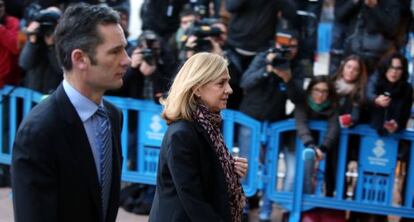Prosecutors present new Tax Agency report defending Infanta Cristina
Document concludes Spanish royal’s infraction is administrative rather than criminal matter


Three judges in the Balearic Islands will decide in the coming days whether Cristina de Borbón, sister to King Felipe VI, finally sits in the dock in connection with the Nóos case.
After a 13-hour session inside a Palma de Mallorca courthouse in which 18 defendants sought to convince the panel that they should be exonerated from the trial, the three judges set February 9 as the start date for the trial proper.
We are all subject to the law, and no difference stemming from social, economic or personal motives can create any room for impunity” Acting Justice Minister Rafael Catalá
Before that, they will determine whether Cristina de Borbón becomes the first member of the Spanish royal family to take the stand in a criminal trial.
The infanta’s defense was strongly aided on Monday by the state’s own legal representatives, who feel that she should be dropped from the case altogether.
Anti-corruption Attorney Pedro Horrach, who has long defended the princess’s innocence, produced a new Tax Agency report exonerating her from the tax crimes attributed to her husband, former Olympic handball player Iñaki Urdangarin.
The infanta has been charged by a private accusation of cooperating with her husband, who stands accused of diverting large sums of public funds into private accounts.
Calls for King Juan Carlos to testify dismissed
On Monday, the court dismissed requests to have former monarch Juan Carlos testify during the Nóos trial. The petition had been made by the defense lawyer for Diego Torres, Iñaki Urdangarin’s business associate at Nóos and the other major defendant in the case.
Torres has claimed in the past that Juan Carlos, who abdicated in June 2014, was aware of Nóos' activities and abetted them. He also wants to hear testimony from Corinna zu Sayn-Wittgenstein, a friend of Juan Carlos's who made the cover of gossip magazines for her alleged relationship with the ruler.
Anti-corruption attorney Pedro Horrach accused Torres’s lawyer of wanting to “turn the trial into a reality show.”
Her role in the case stems from the fact that she co-owns Aizoon, a company allegedly set up by her husband to channel some of the €6.2 million he secured from the regional governments of Valencia and the Balearics for inflated contracts to organize sports events through his Nóos Institute.
Cristina de Borbón used an Aizoon credit card to make personal purchases and claimed business deductions on her 2007 and 2008 tax filings.
The private accusation, filed by a far-right anti-corruption group called Manos Limpias (Clean Hands), claims that Cristina was a “necessary cooperator” in her husband’s crimes.
The new document states that the king’s younger sister was a partner in Aizoon, not a manager, and that her role in the case requires an administrative penalty, not a criminal prosecution.
Meanwhile, Cristina’s own lawyer, Jesús María Silva, held up a study by an economist reducing “by around €50,000” the amount of the fraud, which stands at €587,000.
Silva also produced 10 other legal rulings – three from the Supreme Court and seven from provincial courts – exonerating individuals from tax crimes because neither public prosecutors nor state lawyers had filed any charges.
This argument, known as the Botín doctrine after it was used to drop a tax fraud case against late Santander CEO Emilio Botín in 2007, has been the basis of Cristina de Borbón’s defense all along.
While the three-judge panel decides whether this line of reasoning is strong enough to exonerate the infanta, the government has already held up the case as evidence that Spain’s justice system is fair.
“We are all subject to the law, and no difference stemming from social, economic or personal motives can create any room for impunity,” said the acting justice minister, Rafael Catalá, of the Popular Party (PP).
The minister said the case provides another example that Spain has a “professional and independent” justice system that is going to judge the facts “with absolute objectivity, rigor and legal quality.”
Socialist leader Pedro Sánchez also said that “justice is the same for everyone,” but asked that Cristina de Borbón take the symbolic step of giving up her rights to the throne – she is sixth in the line of succession. Podemos and Ciudadanos, the emerging parties that broke the two-party hegemony at the December 20 election, made similar statements.
English version by Susana Urra.
Tu suscripción se está usando en otro dispositivo
¿Quieres añadir otro usuario a tu suscripción?
Si continúas leyendo en este dispositivo, no se podrá leer en el otro.
FlechaTu suscripción se está usando en otro dispositivo y solo puedes acceder a EL PAÍS desde un dispositivo a la vez.
Si quieres compartir tu cuenta, cambia tu suscripción a la modalidad Premium, así podrás añadir otro usuario. Cada uno accederá con su propia cuenta de email, lo que os permitirá personalizar vuestra experiencia en EL PAÍS.
¿Tienes una suscripción de empresa? Accede aquí para contratar más cuentas.
En el caso de no saber quién está usando tu cuenta, te recomendamos cambiar tu contraseña aquí.
Si decides continuar compartiendo tu cuenta, este mensaje se mostrará en tu dispositivo y en el de la otra persona que está usando tu cuenta de forma indefinida, afectando a tu experiencia de lectura. Puedes consultar aquí los términos y condiciones de la suscripción digital.








































